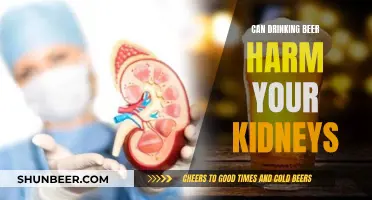
Alcohol is a common trigger for heartburn, and drinking it can increase the likelihood of heartburn and gastroesophageal reflux disease (GERD). Alcohol can relax the lower oesophageal sphincter (LES), the muscle that connects the oesophagus to the stomach, allowing acid to leak into the oesophagus and cause a painful, burning sensation in the chest and upper throat.
However, the relationship between alcohol consumption and GERD is not fully understood, and some studies have found conflicting results. For instance, a 2006 study found that beer and wine triggered reflux compared to drinking water, while a 2008 study found that drinking wine could reduce the risk of reflux oesophagitis, or irritation of the oesophageal lining.
Other factors that can cause or trigger heartburn include lower oesophageal sphincter dysfunction, irritation from certain foods, drinks, or medicines, slow stomach emptying, and hiatal hernia.
| Characteristics | Values |
|---|---|
| Can drinking beer cause heartburn? | Yes |
| Reason | Beer can trigger acid reflux, which causes heartburn. |
| Heartburn | A painful, burning sensation in the chest and upper throat. |
| Cause of heartburn | When stomach acid flows back into the esophagus, or food pipe. |
| Alcohol's role in causing heartburn | Alcohol can irritate the throat or stomach, affect stomach acid, relax the muscle leading to the stomach, and affect food choices. |
| GERD | Gastroesophageal reflux disease, a chronic condition caused by the improper functioning of the lower part of the esophagus. |
| Alcohol's role in GERD | Alcohol can increase the risk of developing GERD, with higher intake and frequency linked to a greater likelihood of the disease. |
| Preventing heartburn when drinking | Staying hydrated, drinking in moderation, being mindful of food choices, avoiding cigarettes, and wearing loose clothing are some ways to prevent heartburn. |
What You'll Learn

Alcohol's effect on the oesophageal sphincter
Alcohol is a common trigger for heartburn. Heartburn is a painful, burning sensation in the chest and upper throat. It occurs when stomach acid flows back into the oesophagus, or food pipe, causing discomfort or pain.
The oesophageal sphincter is a ring of muscle located at the junction between the stomach and the oesophagus. When this muscle relaxes, acid can leak into the oesophagus, causing heartburn. Alcohol can relax the oesophageal sphincter, increasing the likelihood of heartburn.
According to the American College of Gastroenterology, alcohol relaxes the muscles around the stomach, making it more likely for stomach contents to leak out. This can lead to acid reflux and irritation of the oesophagus, causing a burning sensation in the chest.
In addition to relaxing the oesophageal sphincter, alcohol can also irritate the throat or stomach, increase stomach acid production, and affect food choices, all of which can contribute to heartburn.
While alcohol can trigger heartburn in some people, others may be able to drink in moderation without experiencing any symptoms. It is recommended that people prone to acid reflux or living with gastroesophageal reflux disease (GERD) limit or avoid alcohol consumption altogether.
Muslims and Alcohol-Free Beer: Is it Allowed?
You may want to see also

Alcohol's effect on stomach acid production
Alcohol can irritate the gut, including the stomach, and is associated with acid rising from the stomach into the throat, known as acid reflux, or heartburn. Alcoholic drinks can make the stomach produce more acid than usual, which can wear away the stomach lining, causing inflammation and pain (gastritis). Over time, this can lead to painful stomach ulcers.
The effect of alcohol on gastric acid secretion depends on the concentration and type of alcohol. Pure ethanol in low concentrations (less than 5% volume/volume) mildly stimulates acid secretion, while higher concentrations have no effect or a mildly inhibitory effect. Pure ethanol, regardless of how it is administered, does not cause gastrin release in humans. However, alcoholic beverages with low ethanol content, such as beer and wine, strongly stimulate gastric acid secretion and gastrin release. Beverages with higher ethanol content, such as whiskey, gin, and cognac, do not stimulate gastric acid secretion or gastrin release.
The effect of chronic alcohol abuse on gastric acid secretion is unpredictable. Chronic alcoholic patients may have a normal, enhanced, or diminished acid secretory capacity. There is a lack of research on the acute effects of alcohol intake on gastric acid secretion in chronic alcoholic patients.
Beer and Paracetamol: Safe Mix or Health Risk?
You may want to see also

Alcohol's effect on food choices
Alcohol can affect a person's food choices in several ways. Firstly, alcohol can impair judgment, leading to poor food choices that can cause heartburn or digestive issues. For example, after drinking alcohol, people may be more likely to consume larger portions of food, eat late at night, or choose foods that do not agree with them. These factors can contribute to heartburn and other digestive problems.
Secondly, alcohol can increase the likelihood of overeating. Research has shown that alcohol consumption may stimulate food intake and enhance appetite. This means that drinking alcohol can lead to consuming larger portions of food, which can further trigger heartburn.
Thirdly, social drinking is often accompanied by the consumption of fried and fatty foods, which are known triggers of heartburn. Alcohol can also lead to the increased consumption of sugary, citrus, or carbonated drinks, which can contribute to heartburn and acid reflux.
Additionally, alcohol can affect a person's food choices by altering their taste and flavour preferences. Alcohol can enhance certain flavours and reduce bitterness, which can influence food choices and preferences.
Finally, alcohol can impact the digestive system by affecting stomach acid production and limiting the body's ability to get rid of bacteria. It can also damage the lining of the stomach, causing abrasion and swelling. These factors can further influence food choices, as people may opt for foods that are easier to digest or avoid certain foods that trigger digestive issues.
Old Beer: Drink or Dump?
You may want to see also

Alcohol's effect on the throat
Alcohol is an irritant and can burn when it comes into contact with bodily surfaces. When consumed, it can cause an immediate burning sensation in the mouth and throat as it travels down the oesophagus. This is particularly noticeable when consuming high-proof liquor.
Alcohol can also affect the throat indirectly. It can relax the muscle leading to the stomach, which makes it more likely for stomach acid to leak out and irritate the oesophagus. Alcohol can also increase the production of stomach acid, which can flow back into the oesophagus, causing heartburn.
In addition, alcohol can lead to throat problems by affecting food choices. It can impair judgement, leading to the consumption of foods that cause digestive upset. It can also lead to unhealthy behaviours such as smoking, which is a major risk factor for heartburn.
Chronic alcohol consumption has been linked to an increased risk of cancer in the head and neck, including the throat, in a dose-effect relationship.
Dialysis and Alcohol: Is Beer Safe for Dialysis Patients?
You may want to see also

Alcohol's effect on the stomach lining
Alcohol can have a detrimental effect on the stomach lining, and its impact on the gastrointestinal tract is well documented. Alcohol can cause inflammation of the stomach lining, a condition known as gastritis. This can lead to pain, sickness, and even stomach ulcers. If left untreated, these ulcers can be fatal.
The inflammation of the stomach lining is caused by an increase in the amount of acid in the stomach, which irritates the lining. This irritation can also lead to a loss of appetite, nausea, and vomiting.
Alcohol can also affect the function of the muscles in the stomach, impairing their movement and allowing acid to leak back into the oesophagus, causing heartburn.
In addition, alcohol can interfere with the absorption of nutrients in the small intestine, leading to malnutrition and weight loss. It also increases the transport of toxins across the intestinal walls, which can cause liver damage and other organ damage.
The effect of alcohol on the stomach lining is complex and far-reaching, and it can lead to a range of health issues.
Passengers and Beer: Drinking Laws You Need to Know
You may want to see also
Frequently asked questions
Yes, drinking beer can cause heartburn. Beer is an alcoholic drink, and alcohol can trigger heartburn in several ways. These include irritating the throat or stomach, relaxing the muscle leading to the stomach, and affecting food choices.
Alcohol can cause heartburn by relaxing the lower esophageal sphincter (LES), which is a ring of muscle located at the junction between the stomach and the esophagus. When the LES relaxes, stomach acid can leak back up into the esophagus, causing a burning sensation in the chest and throat.
Heartburn is characterised by a painful, burning sensation in the chest and upper throat. It occurs when stomach acid flows back into the esophagus, causing discomfort and pain.
To avoid heartburn when drinking beer, it is recommended to drink in moderation, stay hydrated, avoid eating large portions of food or eating too quickly after drinking, and refrain from lying down or going to sleep directly after drinking.







